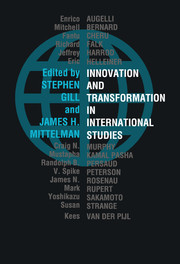Book contents
- Frontmatter
- Contents
- List of contributors
- Preface
- Acknowledgements
- Part I Rethinking and remaking the roots of global social and political theory
- Part II Political economy: the social and ecological anatomy of transformation
- Part III Transformation, innovation and emancipation in global political and civil society
- Part IV Reflections on global order in the twenty-first century
- 13 Civil society and democratic world order
- 14 Imposing global orders: a synthesised ontology for a turbulent era
- 15 The problem or the solution? Capitalism and the state system
- 16 Rethinking innovation in International Studies: global transformation at the turn of the millennium
- References
- Index of names
- Index of subjects
16 - Rethinking innovation in International Studies: global transformation at the turn of the millennium
Published online by Cambridge University Press: 05 July 2011
- Frontmatter
- Contents
- List of contributors
- Preface
- Acknowledgements
- Part I Rethinking and remaking the roots of global social and political theory
- Part II Political economy: the social and ecological anatomy of transformation
- Part III Transformation, innovation and emancipation in global political and civil society
- Part IV Reflections on global order in the twenty-first century
- 13 Civil society and democratic world order
- 14 Imposing global orders: a synthesised ontology for a turbulent era
- 15 The problem or the solution? Capitalism and the state system
- 16 Rethinking innovation in International Studies: global transformation at the turn of the millennium
- References
- Index of names
- Index of subjects
Summary
In the preface to this book the editors posed four questions concerning the meaning and purpose of theory, its relationship to historical transformation, the ways that the writings of major theorists can be regarded as ‘innovatory’ both in their times and as regards world order today, and the agenda for study in the present and the future. Given that the contributing authors are not wedded to any single tradition, it is not surprising that their different backgrounds in terms of discipline, methodological inclination, generation, race, nationality and gender have produced different emphases. To respond to our core questions, the authors have tried to push a range of research genres – normative theory, Marxism, feminism, post-modernism, post-structuralism, post-colonialism and so on.
Whereas this chapter does not presume to present an overview of the contributors' work, it is nonetheless worth noting the broad commonalities that have emerged. There is a shared interest in developing a critical and theoretical perspective on problems of structural change. To do so, several authors choose to focus their research on a series of accelerations and decelerations in history – a set of changes culminating in the current phase of globalisation. Most of the authors take issue with mainstream International Relations, at least with realism, which is the reigning approach. Moreover, some of them seek to theorise resistance movements – that is, opposition to globalising tendencies. Virtually all of the chapters say that while retaining what is valuable, let us leave behind where we were in theory.
- Type
- Chapter
- Information
- Innovation and Transformation in International Studies , pp. 248 - 263Publisher: Cambridge University PressPrint publication year: 1997
- 4
- Cited by

